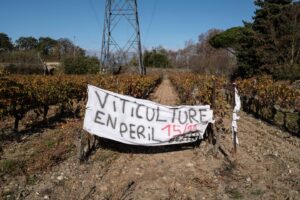
Iñigo Ramírez de Haro (Madrid, 71 years old) is satisfied: he won the case against his older brother Fernando, husband of Esperanza Aguirre, for the sale of a house Goya of his family, the House of Bornos, which was part of his father’s inheritance. “After five years in which I was defamed and slandered, this sentence restores my honor and resolves the immoral and unscrupulous behavior of my brother,” he told EL PAÍS by phone on Tuesday morning, the day after the resolution was announced.
The painting, a portrait of Valentín Belvís de Moncada Pizarro, Count of Bornos (the same title held by Aguirre’s husband), was purchased in 2012 by the entrepreneur Juan Miguel Villar Mir for 5,800,000 euros. Now the older brother has been sentenced to pay Iñigo 853,732.83 euros. “This was the trial of an ordinary citizen against a powerful politician like Esperanza Aguirre. If my brother was able to carry out all these illegalities it is because he felt protected by her power. Yet, against the alleged manipulations of the judges, this sentence demonstrates that impartial and independent justice exists in Spain.”
The dispute over Goya’s canvas did not just mean going through the courts, but it generated a fracture in the Ramírez de Haro family and, not only that, a stain on the Bornos house, according to Iñigo. “There are those who prefer to betray the feelings and history of the family out of greed. Now it seems to me that it was all a lie, an appearance, there was no real feeling”, underlines the marquis. “The monetary issue is important, but more serious is discovering that an entire story of feelings was false: it is a pain that cannot be repaired”.
Iñigo Ramírez de Haro is the Marquis of Cazaza in Africa, a title that the Catholic Kings created for the third Duke of Medina Sidonia, under whose mandate the Moroccan locality was conquered. Hence, perhaps, his good manners and his extensive education, but Ramírez de Haro is also the exact opposite: an enlightened person, a free thinker, a renegade from the aristocracy.
That’s why what attracts attention is his mischievous smile, his acid tongue, his good humor, his progressive and rabidly atheist airs. And independent. “Spain is the Inquisition and war-civilism. The herds hate each other, here there is no possibility of disagreeing by esteeming, as (José Antonio) Maravall said: here one can only disagree by criticizing,” he declared two weeks ago in an interview in Madrid with this newspaper on the occasion of the publication of his new novel, The hypocrites (Renaissance).
In his life there was a tension between different poles: the diplomat who represents Spain on the international scene and the irreverent playwright who, in a work entitled I shit on Godpublished in 2004, it criticized cases of pedophilia in the Catholic Church with appropriate vitriol. That job, which marked a turning point in his career, cost him a few years of death threats from far-right elements (from “Viva Cristo Re!”) and influenced his diplomatic career: when he was already in the vital moment of becoming ambassador, the scandal closed the doors to him.
“I will never appoint you ambassador of Spain because of what you wrote about the Church,” the then Foreign Minister José Manuel García Margallo told him. The author thinks that, in the end, he didn’t fare so badly, as consul for Culture in New York or as deputy ambassador to UNESCO in Paris. Actually, it sounds pretty good. “I had a fascinating adventure thanks to the mediocrity of the foreign ministers I met,” he says. He calls him the “grand inquisitor” popular Margallo and “little inquisitor” of the socialist José Manuel Albares, now in office. “I have been struck by those who hate each other but agree that the author of I shit on God He cannot become an ambassador,” he says.

His new novel, The hypocritesit tells of the lights and shadows of diplomacy: its protagonist is an old diplomat, progressive and atheist, who talks with a young intern, conservative and Catholic, while the new director general of UNESCO is elected. A novel with a lot of dialogue in which the author’s theatrical roots are evident. “Diplomatic life is fascinating: there are no careers where they pay you well and you can live in many countries,” says Ramírez de Haro, who has lived on four continents, from New York to Paris, from Japan to Colombia, from Kinshasa to Belgrade. “So we see that it is like this everywhere, that all people live more or less for the same thing, that everyone wants the same fundamental things. And that all conflicts are generated on the superstructure of nationalism, of hatred towards others, towards migrants.”
Now retired in Italy, he criticizes the solemn verbosity, the frequent disconnection from reality and the inertia that occurs, in his opinion, in many diplomats. “This is a career that allows you to be yourself, you have to invent everything. It’s very interesting to arrive in a place that you have to conquer, making contacts, moving around, organizing, when on the first day you don’t know anyone,” he says. The goal: to sell one’s country abroad, so that it is talked about and known, so that entrepreneurs or artists have an opportunity. For example, during his stay in Belgrade, Ramírez de Haro managed to negotiate a television series in which a Serbian-Spanish couple appeared (in 2015 Margallo fired him for appearing in the Serbian press calling him an “inquisitor”).
“There are many mediocre ones, the good diplomat is the one who invents the profession, the one who does what has never been done,” he explains. Although, according to him, the easiest way to grow is to participate in one of the two large parties and invite those who can support you to dinner at your house (you have to specialize in a couple of dishes). “Spain is a clientecracy“he says.

Ramírez de Haro’s obsession with religion stems from his childhood among the Jesuits and in an aristocratic environment. “I studied with the Jesuits and they declared me subnormal at 11 years old. My life was focused on trying to prove that I wasn’t, so I dedicated myself to doing the hardest thing,” he says. That’s how he entered Aeronautical Engineering, where he did very well because he was good at math and on the blackboard: he even found a job in the United States at the McDonnell-Douglas airline. “And that when in the United States it was a dream and in Spain fucking wasn’t a sin, it was a miracle!”, he says. But the rigidities of engineering were contrasted by the fluidity of interpretation. Ramírez de Haro became an actor, theater director and playwright. During his diplomatic stay in Bogotá, he programmed the Popular Theater and created an Ibero-American company.
“Religions should be prohibited until the age of 18, like alcohol,” says Ramírez de Haro, who is also concerned about a certain revival of religious sentiment in some parts of the world and society, the loss of universalist values, the weakening of democracy and the imposition of the law of the strongest. Escaping religion also meant escaping from the closed and oppressive world of the aristocracy (to which he dedicated books such as The bad bloodin editions B, o The Medina Sidonia case. The controversial story of the Red Duchessin The Sphere of Books) which, although in ancient times it referred to exemplarity, now defends that it is something else: “The nobility now does not pursue excellence, it is a group of people ugly, Catholic and sentimentalas Valle-Inclán would say, if they are not from the PP they are from Vox, who dedicate themselves practically to nothing,” the author complains. “Now what there is is a aristocanalla”, he adds.




